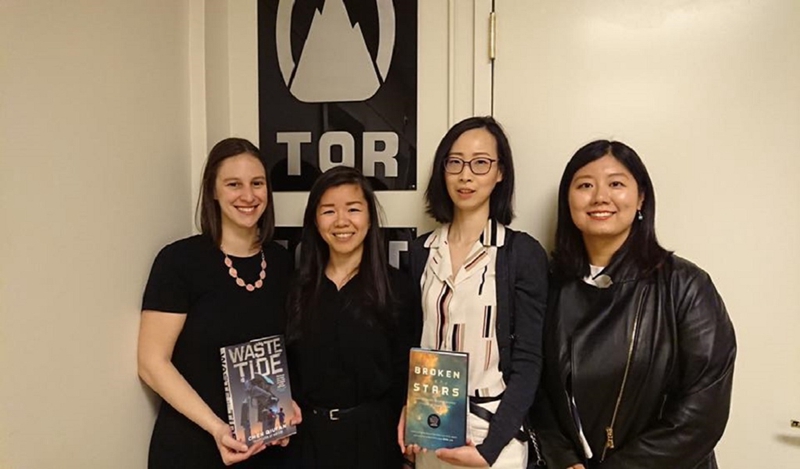The global rise of Chinese science fiction in recent years surprised few. The worldwide acclaim of Liu Cixin’s The Three-Body Problem trilogy was a major driver by itself. The phenomenal series was continuously translated and published in various languages, hit numerous best-seller lists, earned recommendations from celebrities like Barack Obama and Mark Zuckerberg, and won trophies like the Hugo Award, Locus Award, Kurd Laßwitz Award, Premios Ignotus, Seiun Award, and many more. But many other sci-fi works translated from Chinese into foreign languages were also important. Many moving parts composed the overall shape of this new wave of Chinese science fiction going abroad.
Back in 2011, Ken Liu published his first translations of Chinese sci-fi titles The Fish of Lijiang by Chen Qiufan and Mark Twain Robots and The City of Silence by Ma Boyong. It was the debut of a great translator who brought Chinese science fiction to the world by working with others. A few years later, he translated Liu Cixin’s The Three-Body Problem (2015), which won the Hugo Award—the first translation to win the prominent sci-fi award. Since then, Ken Liu has worked on the translation of three other novels: Waste Tide (2019) also by Chen Qiufan, The Redemption of Time (2019) by Baoshu, and Vagabonds (2020) by Hao Jingfang. All these books are unique, showcasing the richness of Chinese science fiction, from golden-age classics to cyberpunk, from comedy to philosophical utopian experiments. As an established writer himself and a Chinese-American who grew up in both cultures, Ken Liu developed a sharp knack for mediating between languages and nuances. He also became dedicated to bringing the diverse voices of Chinese writers to English readers. Liu published two anthologies of his translations and editing of Chinese science fiction— Invisible Planets (2016) and Broken Stars (2019). They include both fiction and non-fiction, providing a wider picture of all the facets of Chinese science fiction.
Another important platform for Chinese science fiction in translation is the magazine Clarkesworld, which launched in 2011 and eventually formed a partnership with Storycom, a Chinese science fiction start-up focusing on fiction commercialization, which emerged from the 2015 Chinese Science Fiction Translation Project. Since its centennial issue in January 2015, Clarkesworld has published over 60 Chinese sci-fi works, introducing around 50 Chinese authors to global readers including Xia Jia, Fei Dao, Chi Hui, A Que, Zhang Ran, Jiang Bo, and Han Song. These names have all been honored extensively in China and represent diverse faces of the new wave of Chinese science fiction. The translation project has not only opened doors for more sci-fi works from China but from all over the world.
Backed by a foundation in magazine publication, Neil Clarke, the publisher and editor-in-chief of Clarkesworld, launched a Kickstarter campaign for Xia Jia’s story collection, which turned into the first crowdfunded book of Chinese science fiction translated into English. A Summer Beyond Your Reach: Stories by Xia Jia (2021) achieved 120 percent of the target sum within only 10 days and met three stretched goals in a month. The campaign was a celebration of both the 15th anniversary of Xia Jia’s writing career and a milestone for Chinese science fiction going international.

Covers of A Summer Beyond Your Reach: Stories by Xia Jia (2021), the first crowd-funded book of Chinese science fiction translated into English, and The Way Spring Arrives and Other Stories (2022), an anthology written, translated, edited and designed by an all-female-and-non-binary team.
The popularity jump has attracted the attention of academia. Columbia University Press published The Reincarnated Giant: An Anthology of Twenty-First-Century Chinese Science Fiction (2018), edited by Mingwei Song and Theodore Huters, two established scholars of Chinese literature. The anthology included works by authors from not only the Chinese mainland but also Hong Kong and Taiwan. Mingwei Song’s own academic essay collection New Wave in Chinese Science Fiction: History, Poetics, Text (2020) was chosen for the Chinese Academic Translation Project of the National Social Science Fund of China. Academic journals such as Science Fiction Studies, Comparative Literature & World Literature, SFRA Review, and Vector have all published special issues on Chinese science fiction. Major academic publisher Routledge included The Making of The Wandering Earth: A Film Production Handbook (2022), edited by Jiaren Wang and Regina Kanyu Wang, in its “Studies in Global Genre Fiction” series.
Over the past six months, three more anthologies of Chinese science fiction have been released in English. Sinopticon 2021: A Celebration of Chinese Science Fiction (2021), translated and edited by Xueting Christine Ni, was the first English translation to be directly acquired by a British publisher instead of one in the United States. The Way Spring Arrives and Other Stories (2022), edited by Yu Chen and Regina Kanyu Wang, was a project edited, written, translated, and designed by an all-female-and-non-binary team. New Voices in Chinese Science Fiction (2022), edited by Neil Clarke, Xia Jia and Regina Kanyu Wang, is an anthology featuring Chinese sci-fi authors who have never before been published in English. All those books share a vibrant and visionary commitment to helping Chinese science fiction bloom globally.
A quick scan of every publishing project shows that most are based on individual efforts and earning potential. This is the grassroots nature of Chinese science fiction. Every reader, writer, translator, editor, publisher, and scholar is already a fan of Chinese science fiction. They all inherently join the mission and make major contributions to spreading stories that they love to a wider audience with enthusiasm along the way.

The author is a writer, researcher, and editor currently pursuing a Ph.D. under the CoFUTURES project at the University of Oslo. She writes science fiction, non-fiction, and academic essays in both Chinese and English and has been honored by the Xingyun (Nebula) Awards for Global Chinese Science Fiction, the SF Comet International SF Writing Competition, the Annual Best Works of Shanghai Writers’ Association, and more.















